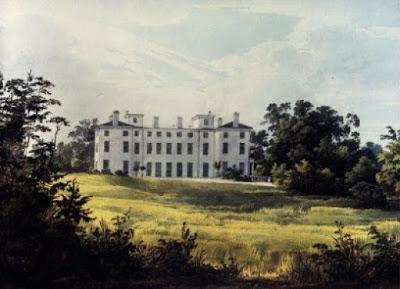Tsunami, 55 & 56. The King in New Jersey.
Once upon a time, there was a man who had been destined for the priesthood by his father, though he would have liked to be a soldier. He never became a soldier of Christ, but his brother made him king, twice. Though royalty was not to be, and he settled down in the new republic of the United States, eventually ending up spending his last days in Florence, where he died.
Apparently, he was abstemious and conscientious. He loved managing his estate, reading, and gardening. He never felt himself destined to greatness, though he admired his younger brother, and helped him as well as he could. The man was Joseph Bonapart.
Joseph was caught up in the intrigues and machinations of his younger brother Napoleon's attempts to create a French empire in Europe. His first attempt, placing Joseph as King of Naples, was rather successful. Joseph was popular with the people of the Kingdom, and he initiated changes that made life easier for many. But it wasn't to last.
In 1808, during the conflict between Carlos IV and his heir, Fernando VII, Napoleon intervened. He wanted Spain more firmly within his orbit, as a counterpoint to England's strong support of Portugal, which had already brought about skirmishes between Spain and Portugal. So, he forced both Carlos and Fernando to abdicate in favor of Joseph, who left Naples to become Joseph I of Spain.
Spain was not Naples, and while the Neapolitans might have liked him, the Spaniards saw him as a French atheist devil. One of the favorite nicknames for him was Pepe Botella (Joe Bottle - Pepe is a version of José, or Joseph), because of a wide belief that he downed alcohol at a huge rate. In reality, he was a very light drinker.
After guerilla tactics, insurrections, and battles, Joseph finally fled from Spain. He managed to take some of the Spanish crown jewels with him to make his life more comfortable later on, but a train loaded with art and other valuables belonging to the Spanish royal house was confiscated by the English. Its contents wound up in Apsley House, the Duke of Wellington's town house in London, where they can still be visited today.
In 1816, Joseph eventually ended up in the United States. There, he stayed for a while in New York City, until he bought a large estate in the state of New Jersey, at Point Breeze, where he built a mansion. The first one burnt down after four years, but the second one that was built on the site became the "second finest house" in the United States, the first being the White House. He also bought a large tract of land in upstate New York, which included a lake, which is now called Lake Bonaparte, where he also built a home.
But Point Breeze became the mecca for European culture in the beginning years of the nineteenth century. With 8,000 volumes, Joseph's mansion had the largest library in the entire country. People of culture and politics visited often. He encouraged visitors and artists, and often lent out artwork to the Pennsylvania Academy of Fine Arts and other galleries. He let locals wander through his park, and skate on a lake in his property in winter. Joseph was well liked by his neighbors, high and low, which fact was attested to when, during the fire in his first mansion, neighbors all went into the burning building to rescue as many of the treasures there as possible.
Though he led a pleasant life, he returned to Europe, and was in Florence when he died in 1844. He left his mansion to his eldest grandson, who auctioned it and the contents off. Many of the art pieces made it to museums like the New Jersey State Museum, the Athenaeum of Philadelphia, and the Philadelphia Museum of Art. Many others ended up in private collections, where they remain to this day. The house was torn down, and the property passed through various hands until, in 2020, the City of Bordentown, along with a couple of public associations, bought it, with the intention of converting the grounds into a public park, with a museum in the only building dating from the era that still stands, the old gardener's house.
Generally, one thinks of Napoleon's association with America only in terms of the Louisiana Purchase, yet his brother once brought the scintillating cultural life of the finest Parisian salons to New Jersey. It's a shame history like this isn't made more known. The nickname of Pepe Botella tells only a half story.
Life continues.



I didn´t know about this.
ReplyDeleteNeither did I, until I saw an article about the proposed park, by chance.
Delete